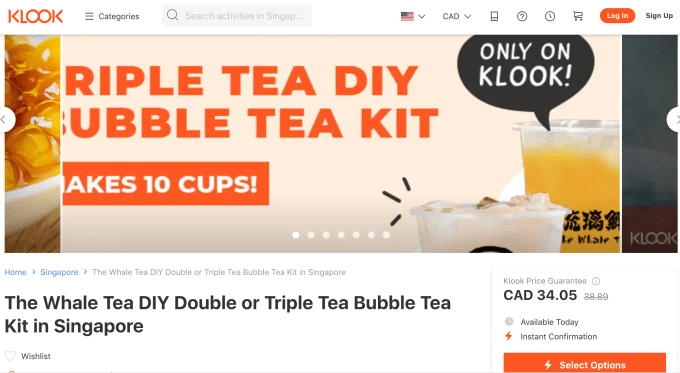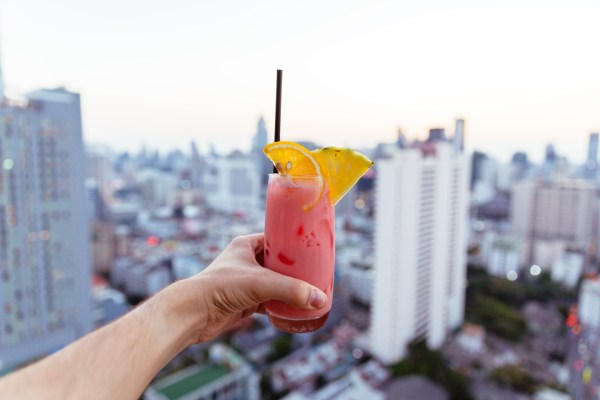Spring 2020 was gloomy for Klook. As countries closed their borders and went into complete or partial lockdown, the SoftBank-backed travel platform saw its revenue plummet by as much as 90% through March and April. The World Travel and Tourism Council said in April that the coronavirus could put up to 100 million jobs in the global travel and tourism at risk.
But in the dark times, opportunities were also bubbling up.
Six-year-old Klook enables travelers, primarily from Asia, to discover and book overseas experiences ranging from Napa Valley wine tastings to staying with a farming family in Cambodia — a bit like Airbnb Experiences. It then takes a cut from each transaction that happens between the customer and activity vendor.
Before COVID-19, the startup, which crossed the $1 billion valuation mark back in 2018, was seeing 30 million monthly user sessions a month; by April, the figure shrank to 5 million. The constraints on people’s movement across the world, which is the foundation of its business, forced Klook to quickly rethink product offerings.
“At the end of the day, we are in the business of fun things to do. There are things to do at home, as well as local things to do when people could travel,” co-founder and chief operating officer Eric Gnock Fah told TechCrunch over a phone interview. “Now [the pandemic] is giving us an opportunity to add a new aspect to it.”
Staycation
Cooped up at home, people around the world turned to cooking, handcraft and other domestic projects as an outlet for entertainment and creativity. Klook responded to the demand by offering do-it-yourself kits for making bubble tea, macarons, candles and more — and delivering the material to people’s doorsteps. For people who were still eager to see the world, Klook partnered with landmark sites worldwide on online virtual tours, amassing close to 660,000 views in its first two livestreamed experiences.
As countries gradually eased coronavirus curbs amid positive signs of pandemic control, Klook swiftly rolled out domestic travel packages for local travelers, pivoting from its focus on outbound tourism. The startup had bottomed out in mid- to late April, while growth in May was prompted by domestic consumption in the Greater China area, which was among the first regions to recover from the health crisis.

Klook’s stay-at-home bubble tea kit. Image Credits: Klook
It’s not easy to quickly pivot to a field that’s already crowded with giants. In China, one of its main markets, Klook is in an uphill battle with online travel incumbents like Ctrip and Qunar. But Gnock Fah believed his startup has a unique selling point: niche, curated activities as opposed to tourist hotspots.
“China is definitely a competitive market, but it’s also big enough,” said the executive. “It’s not just about price. It’s easier to compete on price, but on unique offerings, a lot of content and trust is needed.”
For example, in Shenzhen, which houses Klook’s research and development center, the company links customers to windsurfing classes on the city’s western edge, a little-known resource even among locals. It also offers skateboarding, bouldering and skydiving packages to attract its local users in China who are primarily in their early 20s.
The company has a team on the ground that goes and tries out activities, produces content about them and eventually presents the details of merchants to customers. On the supplier end, Klook has developed a merchant system — the main focus of its R&D team — to help small, independent experience suppliers go paperless and reach consumers.
“This is truly the opportunity to capture domestic tourism. What we do is to add some joy back to consumers … rather than just [having them] go abroad or stay at home,” said Gnock Fah.
Travel like locals
The inventory of hyperlocal activities that Klook built up during the pandemic will continue to serve the company in post-COVID times, as the startup braces for a future of savvy, picky international travelers.
“As a frequent traveler, you eventually become more like locals, so the opportunity that we’re trying to capture now is going deeper into the supply for things that are relevant for frequent visitors,” Gnock Fah suggested.
Socially-distanced experiences like adventure and outdoor activities are in high demand at the moment. Even before the pandemic, Klook was seeing an uptick in the category, recording over 250% year-on-year growth in booking 2019.
In countries with extended stay-home restrictions, people are actively searching for domestic activities on Klook, foreshadowing a rebound in travel once people are able to get out again. Surveys by the startup showed that the pent-up demand for travel is “quite strong.” In April, about 60% of the platform’s total number of searches across the APAC region and Europe were related to domestic experiences. By June, over 95% of searches in Taiwan and Hong Kong were purely domestic.
“The uncertainty is when the border will open and how will travel look. I think the demand and interest is still there. Now, is it going to be truly rebounded to exactly the same level as 2019? Realistically speaking, of course not. From the economic impact perspective, that definitely has taken a toll,” said Gnock Fah.
But the executive believed that the recovery phase will eventually make up for the slack when merchants, hotels and flights start to offer enticing deals in post-COVID times.
When asked what advice he would give to startups coping with coronavirus impact, Gnock Fah said: “It’s important to know what the future is going to look like and not veer away too much from the core competency and the mission of the company. At the same time, you need to be agile and know what needs to be done for the short term to ensure that the long term still exists.”
That confidence is in part contingent on the company’s healthy cash flow. The entrepreneur told us that even if the company doesn’t raise money in the near future, “We are still in very good shape to go through this crisis and come out from this stronger.” Klook is profitable in a number of markets but overall is still in an aggressive expansion mode, which often means burning cash.
For Klook, the future is one where traveling has become part of people’s daily lives. “Going traveling isn’t that expensive compared to even staying at home and doing things locally,” Gnock Fah asserted.
